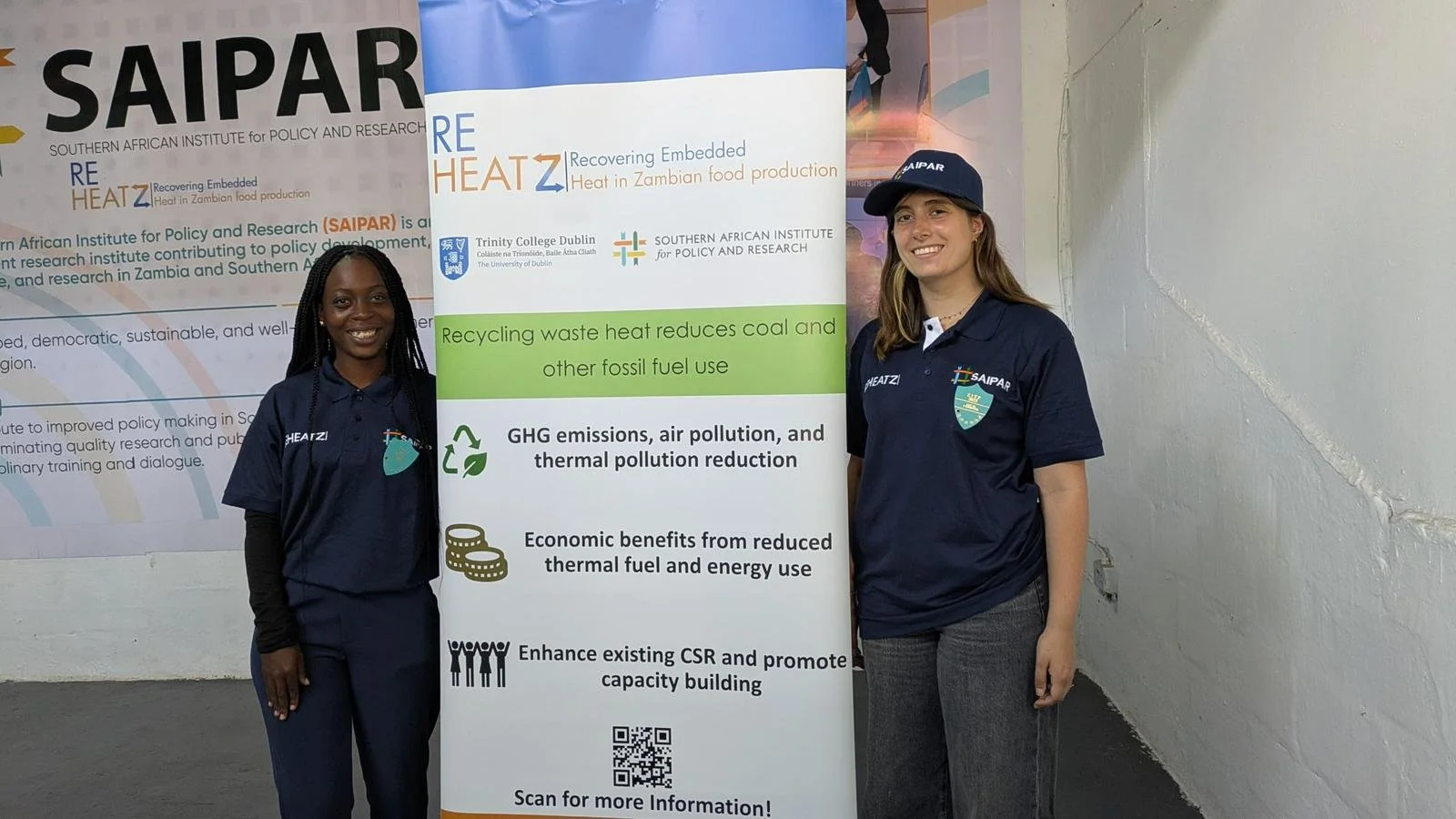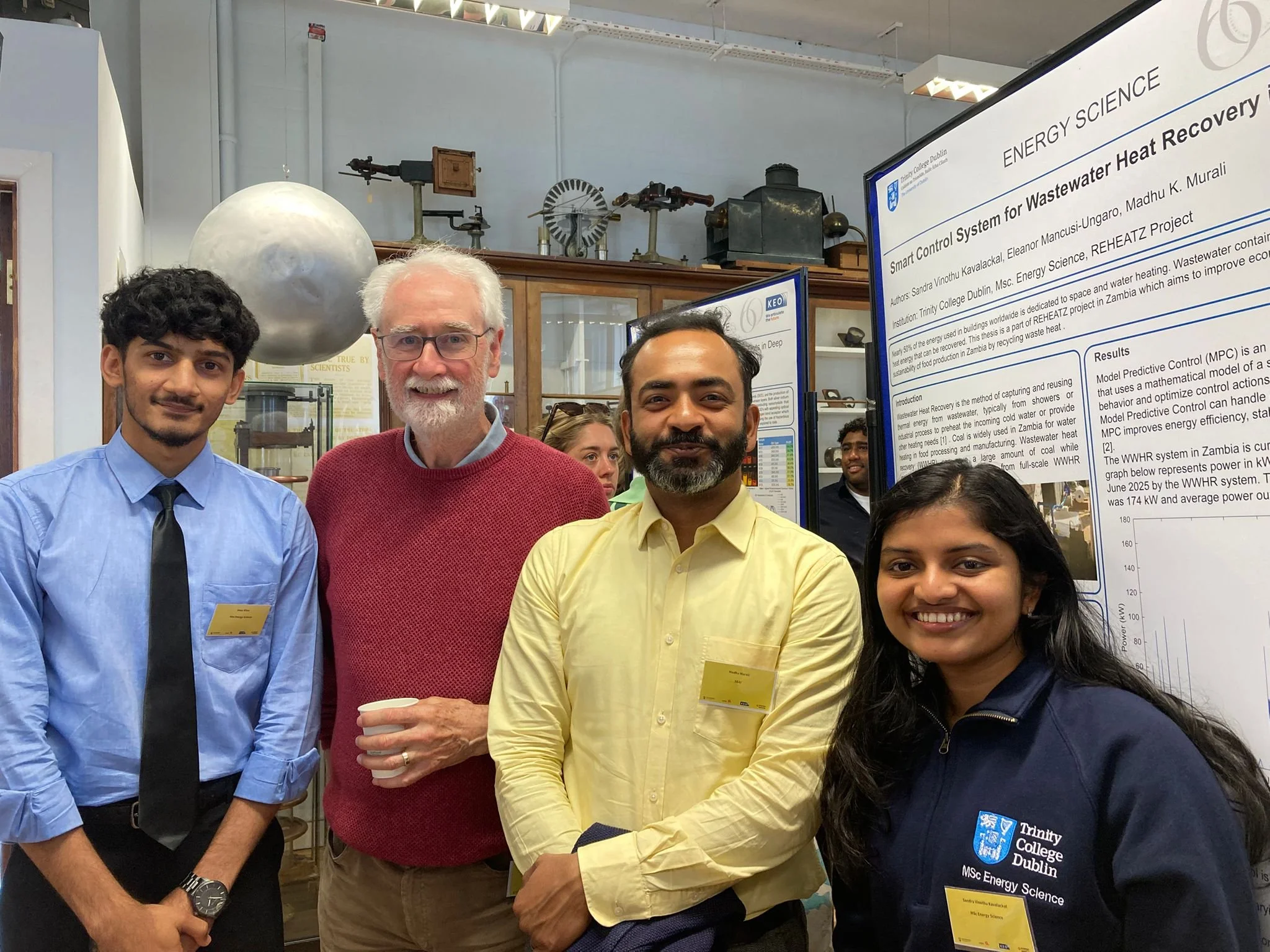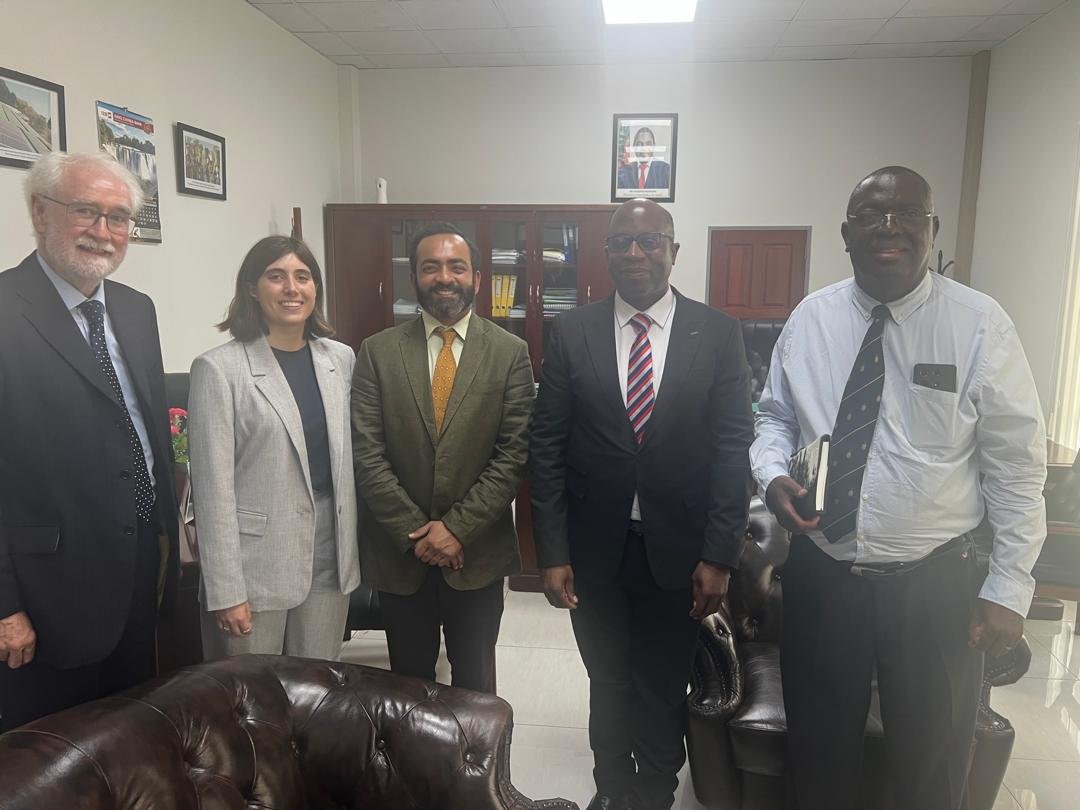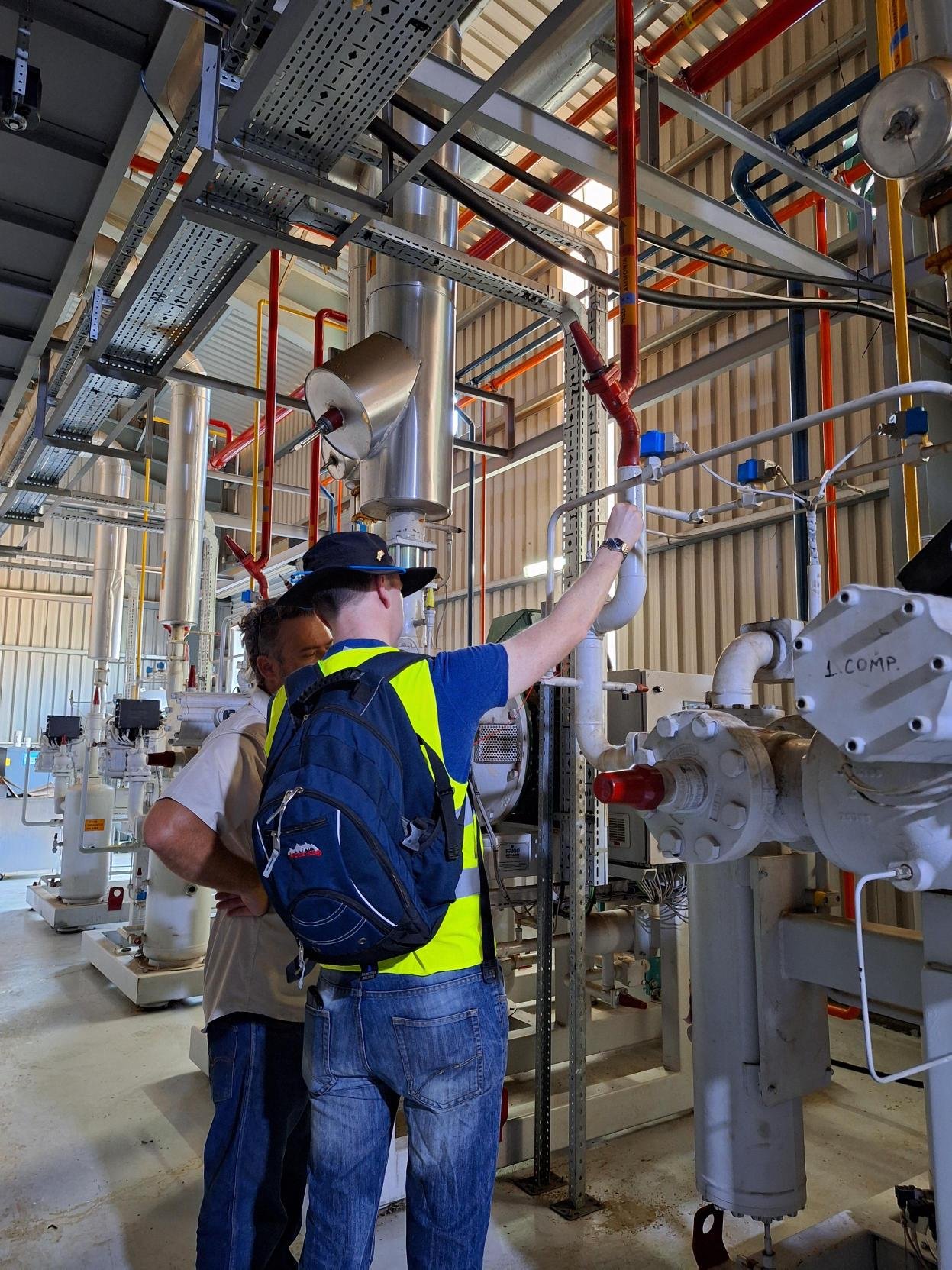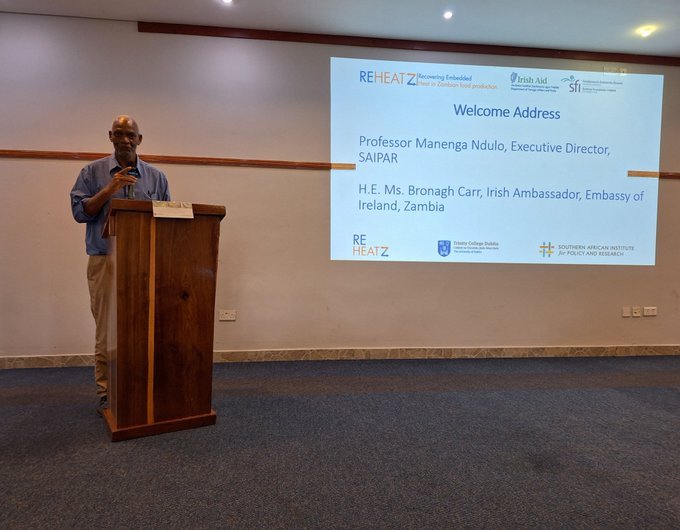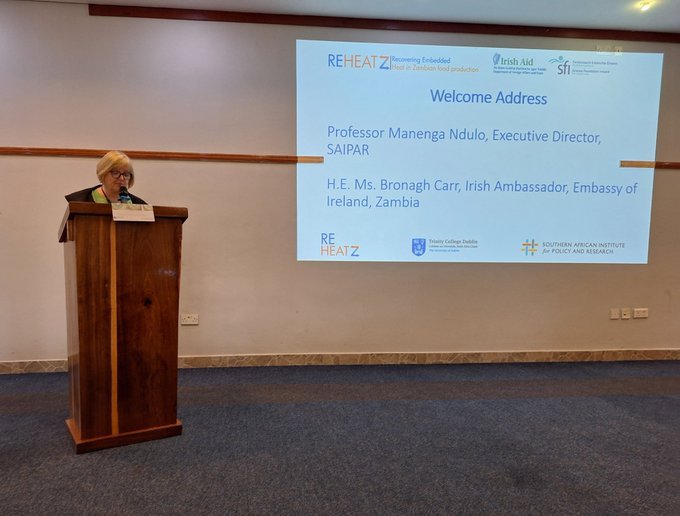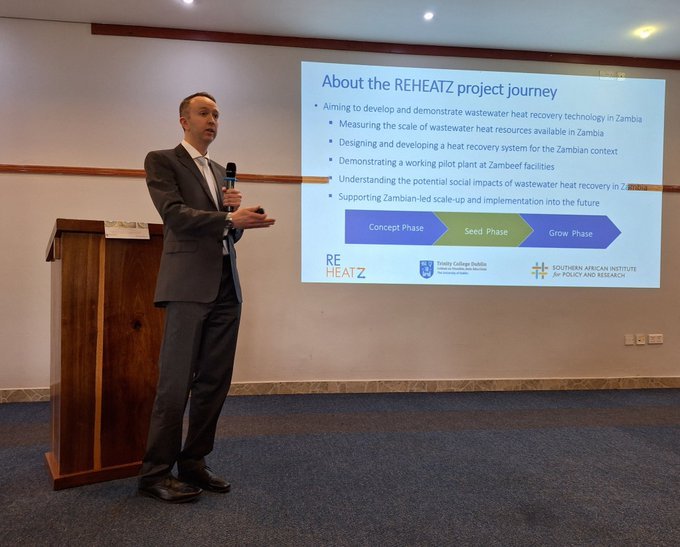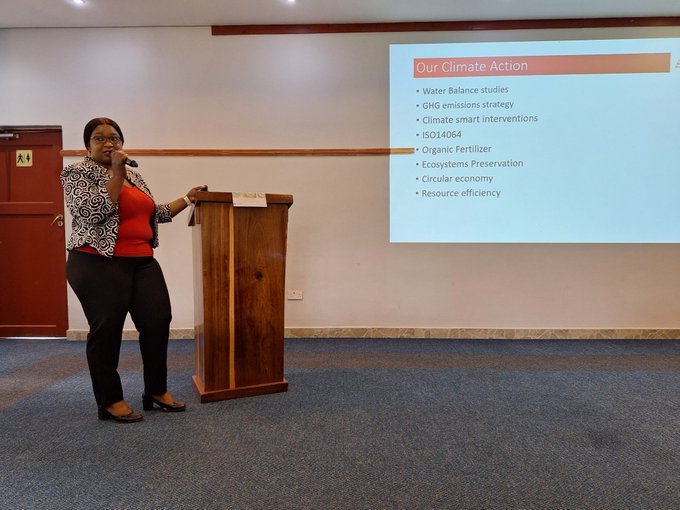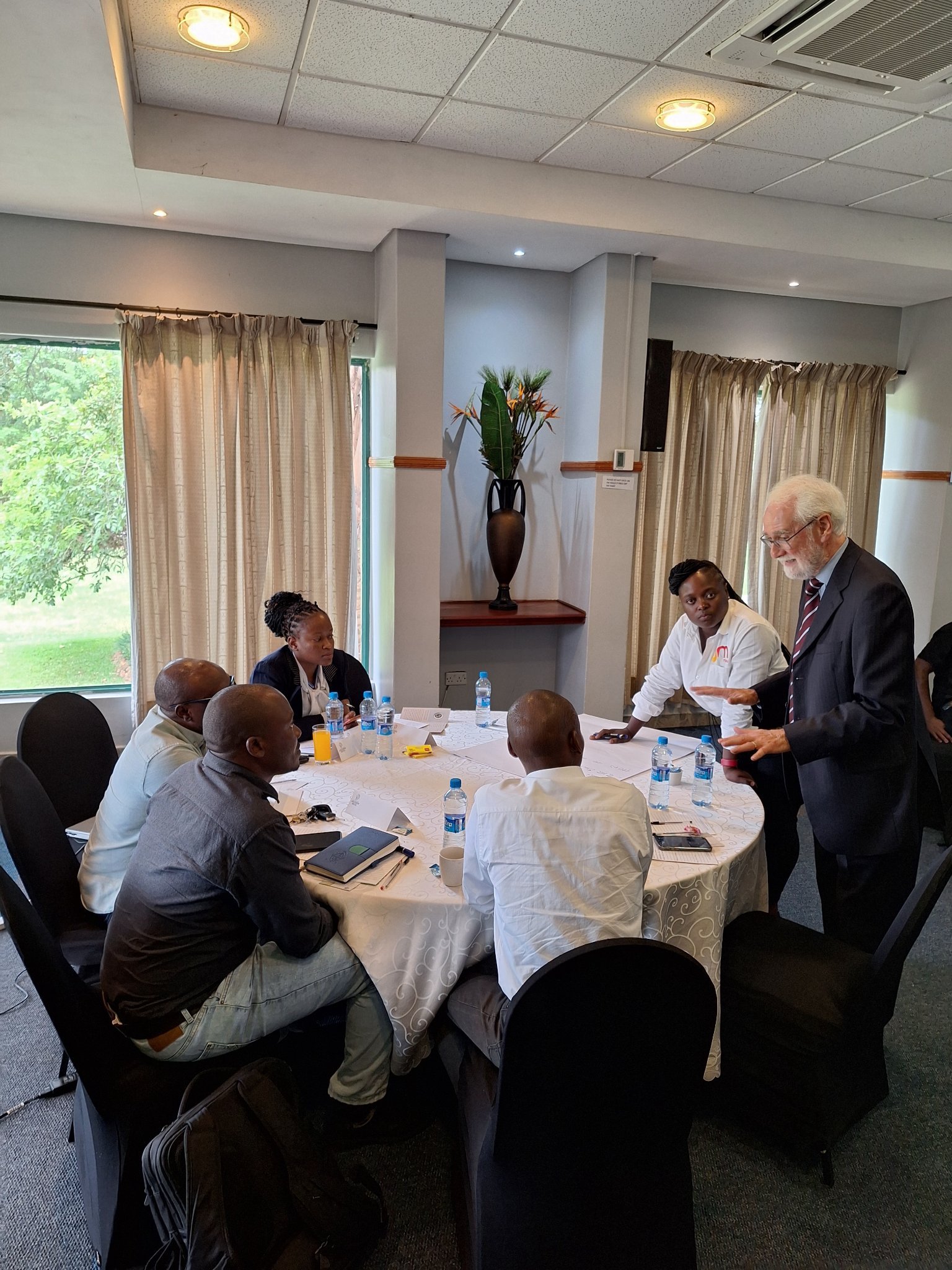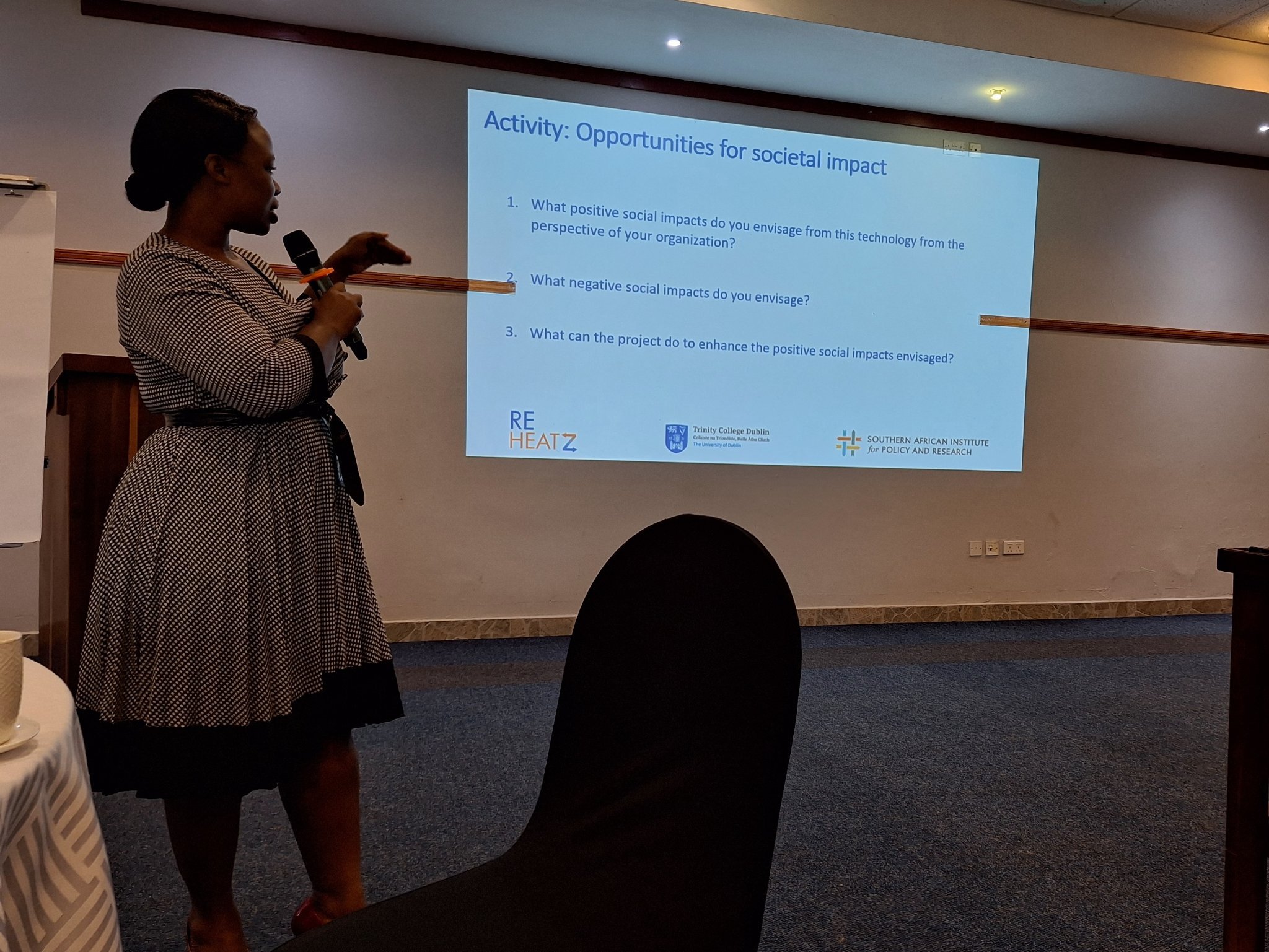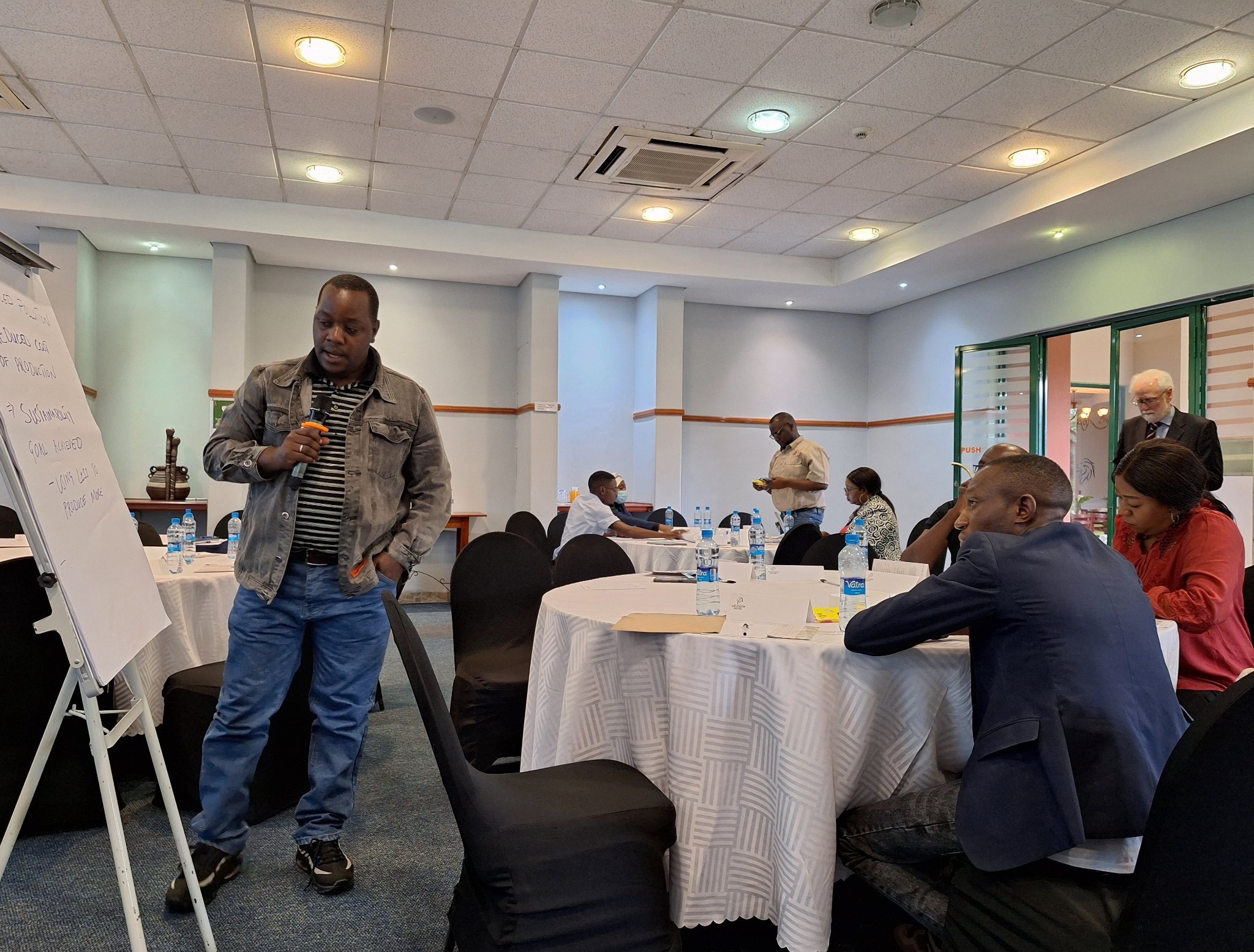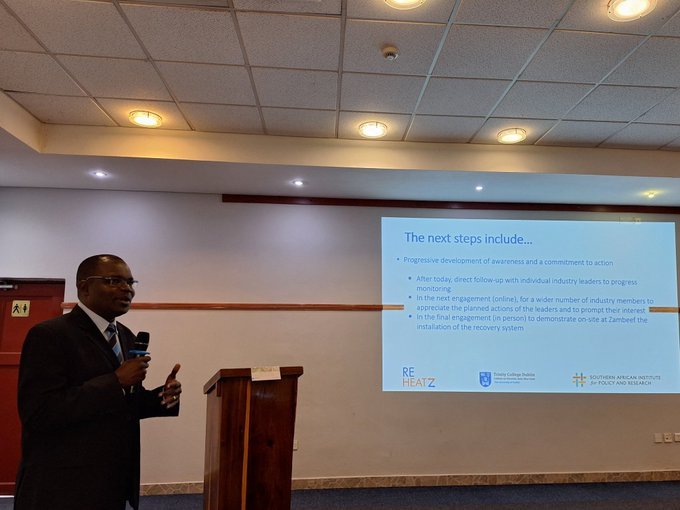REHEATZ Summer Update
It might be hard to believe that a year ago, the REHEATZ project was announced as one of the SDG Challenge Grant projects continuing to the Prize Phase. Looking back on the last year, however, it’s harder to believe that it’s only been a year since the Prize Phase projects were announced. Especially in the last three months, the REHEATZ project team has been on the road, spending time in Cape Town, Lusaka, and Ndola in June, July, and August.
In late June, we made our first visit to Cape Town. One of the REHEATZ Prize Phase plans is to expand activities beyond Zambia to other parts of Southern Africa. After desk research conducted by Mr. Lucas Novakowski and Ms. Eleanor Mancusi-Ungaro earlier this year, we chose to focus on South Africa, and Prof. Paul Coughlan’s colleagues in the Trinity College Dublin Masters in Business Administration led us to Cape Town. Once there, we met with representatives from the National Cleaner Production Centre of South Africa (NCPC-SA) and made site visits to Klein River Cheese and Rhodes Food Group.
Ahead of the visit, Prof. Aonghus McNabola and Dr. Godfrey Hampwaye had hosted a webinar with the South African Association for Food Science and Technology, and we had had online meetings with the NCPC-SA. These online events laid a solid foundation for our in-person meetings! Since our visit to Cape Town, we’ve taken steps to continue our work with the NCPC-SA and are looking forward to future meetings with them this fall. Although this visit was only a few days long, we hope to return to South Africa before the end of the project.
In July, the REHEATZ team came together in Lusaka for a visit to the system at Zambeef Huntley Farm. You can see a 3D tour of the site on the Communications page or online here! The new hot well and solar panels were installed by graduates from Build-It International, one of our new Prize Phase partners. In our plan for this phase of the project, the focus of the REHEATZ project has expanded slightly. In addition to the engineering aspects of the project led by Prof. Aonghus McNabola, we’ve taken a more active role in social impacts and capacity building in Zambia. Build-It’s work in skills training for Zambian women and youth has allowed us to work together to promote green jobs training and employment.
The week in Lusaka was also a chance for the Irish team members to meet with our existing Zambian stakeholders -- including the Ministry for Green Energy and Environment and the Embassy of Ireland – and make introductions to new possible partners at ABSA, WWF, and the Ministry of Health.
(L-R): Prof. Paul Coughlan, Dr. Godfrey Hampwaye, Prof. Aonghus McNabola, and Prof. Pádraig Carmody outside the WWF office in Lusaka
After a few days in Lusaka, Mr. Derrick Bwalya Tembo, Ms. Nchimunya Simbwelede, and Ms. Eleanor Mancusi-Ungaro left the other team members behind and drove to Ndola. There, they participated in the 59th Zambia International Trade Fair ahead of REHEATZ’ participation in the Lusaka Agricultural Fair just last week. Meanwhile, back in Ireland, Energy Science MSc students Sandra Vinothu Kavalackal and Maaz Khan presented their work on the REHEATZ project to professors, students, and industry representatives at the annual Energy Science Seminar.
What’s next for the next year? We hope to install a heat pump at Zambeef later in 2025 to round out the system and submit a policy draft to the Ministry of Green Economy and Environment to support the development of similar systems in Zambia in the future. Post-project, we will continue our work through a Zambian-led nonprofit.
Ms. Nchimunya Simbwelede and Ms. Eleanor Mancusi-Ungaro at the 59th Zambia International Trade Fair in Ndola
Mr. Raymond Siebrits of Klein River Cheese and the REHEATZ team
(L-R): Dr. Godfrey Hampwaye, Mr. Derrick Bwalya Tembo, Ms. Laura Nkhuwa, Dr. Danny Museteka, Ms. Eleanor Mancusi-Ungaro, Mr. Brent Goliath (NCPC-SA), and Prof. Paul Coughlan
Dr. Godfrey Hampwaye and Prof. Paul Coughlan inspecting the site
(L-R) Mr. Derrick Bwalya Tembo, Ms. Laura Nkhuwa, Ms. Nchimunya Simbwelede, and Dr. Godfrey Hampwaye with SAIPAR staff at the Lusaka Agricultural and Commercial Show
(L-R): Mr. Maaz Khan, Prof. Paul Coughlan, Dr. Madhu K. Murali, and Ms. Sandra Vinothu Kavalackal at the Energy Science Seminar
Build-It International Announces Collaboration with REHEATZ
We're very excited to announce our partnership with Build-It International! As part of the social impacts dimension of the REHEATZ project, we've been working together to upskill previous Build-It graduates in plumbing. Those graduates will then be employed on the construction of our full-scale system at Zambeef Huntley Farm later this month, creating green jobs for young women and men in Zambia! You can read Build-It’s announcement of the partnership here.
November REHEATZ Update
In the first week of November, the REHEATZ team gathered in Zambia for the first in-person meeting of the Prize Phase!
The week started with a meeting at SAIPAR, after which we set off to Build-It International’s Centre for Excellence and a site visit to Zambeef Huntley Farm. We were first introduced to Build-It and their work during the Seed Phase, and we plan to continue engaging with them around capacity building throughout the Prize Phase. During our visit, we met BII Research Coordinator Sarah M. Mulenga for the first time! REHEATZ members Godfrey Hampwaye, Padraig Carmody, and Laura Nkhuwa are excited to work with her as part of the social and societal impact components of our project. At Huntley Farm, we were able to collect a new batch of data from our pilot system and begin planning the full-scale scope of works with the valuable input of Zambeef Environment and Social Risk Manager Priscilla Dinga.
New site visits continued throughout the week, with trips to a seed oil processing plant, a beverage manufacturer, and an animal feed plant, and the installation of temperature monitors in areas of high potential. Each site offered unique opportunities and challenges for WWHR, and we look forward to the results of the monitoring.
One of the great benefits of the Prize Phase is the extended time frame, which gives us more opportunities to explore societal and political impacts of the project in Zambia. On Wednesday, REHEATZ members Godfrey Hampwaye, Eleanor Mancusi-Ungaro, and Paul Coughlan led meetings with the Zambian Ministry for Green Economy and Environment and the Ministry of Energy to learn more about the ongoing energy crisis in Zambia and the potential impacts of WWHR nationwide. While in Zambia, we also met with representatives from the Embassy of Ireland and learned more about international development programs in Zambia that we could potentially partner with to increase our social impacts and extend our project past the end of the Prize Phase
To continue our knowledge dissemination in Zambia, Laura Nkhuwa, the newest member of the REHEATZ team, was instrumental in securing a spot for REHEATZ at the Wiggle Ventures Climate SMART Entrepreneurship conference in Lusaka later this month. Team leader Aonghus McNabola presented virtually on the REHEATZ project, and Laura, Godfrey, and Derrick attended in-person and ran a demonstration stall. You can watch a pre-conference video interview with Madhu K. Murali about the REHEATZ project here.
2025 will be a big year in the REHEATZ project, with a full-scale system installation at Zambeef, the possibility of a second demonstration site in Zambia, and deepening of our collaboration with Build-It and the ministries. The week in Zambia was full of productive meetings and insightful discussions, but by the time the Irish team members got back on the plane to Dublin, we were several steps closer to achieving all of these goals.
REHEATZ Advances to Prize Phase
On July 22nd, Science Foundation Ireland and Irish Aid announced that REHEATZ, along with the Royal College of Surgeons Ireland SURGWater project, would advance to the Prize Phase of the SDG 13 Challenge. Over the next two years, REHEATZ will receive €650,000 to continue our research in Zambia.
This work comes at a critical time for the Zambian food and beverage sector. Amidst an ongoing national energy crisis and severe drought, Derrick Bwalya (REHEATZ, SAIPAR) is confident that REHEATZ “will play a pivotal role in helping food and beverage production companies to reduce the cost of production”. This was seconded in a celebratory message from our primary partner, Zambeef Products PLC, who congratulated us on our “remarkable efforts to enhance the economic and environmental sustainability of food production in Zambia”.
The judging panel was impressed by our experienced and motivated team and commended us on developing a realistic set of goals for the future. Looking forward, we plan to fully integrate our system at Zambeef, expand our social impacts through a partnership with Build-It International, and ultimately establish a more permanent presence in Zambia. REHEATZ and Trinity College Dublin team member Madhu K. Murali described the work as “challenging, interesting, and immensely rewarding”, and that he hopes to “leave a lasting REHEATZ legacy of increased efficiency and reduced carbon emissions in Zambian manufacturing”.
Speaking about the transition between Seed and Prize Phases, Godfrey Hampwye (REHEATZ, SAIPAR) acknowledged the “minimal transfer of skills and social impacts on the community [in the Seed Phase] owing principally to the limited duration of the project. However, the expectations in the prize phase are to increase skills transfer and enhance social impacts among the communities.”
Prof. Aonghus McNabola during a site visit in April. REHEATZ will continue to work with Zambian manufacturers to identify opportunities for waste heat recovery.
Eleanor Mancusi-Ungaro (REHEATZ, TCD) also highlighted the importance of continuing the REHEATZ work. “I hope we can work with the Ministry of Green Economy and the Environment to strengthen our connections in Zambia and continue this work after 2026.”
We are excited to take on the new challenges associated with the next two years of our project and look forward to providing new updates soon! You can read more about the SDG 13 Challenge here.
Dr. Madhu Murali demonstrating the pilot heat recovery system at Zambeef Huntley Farm.
Pilot Plant Launch - April 23rd 2024
After an installation visit in February 2024, the pilot heat recovery plant at Zambeef Huntley Farm, Chisamba, officially launched on April 23rd! As part of the launch, the REHEATZ team hosted a presentation and site visit at the Farm. It marked the Irish team’s final visit to Zambia before the end of the Seed Phase, and our third Zambian event in the last year.
Dr. Godfrey Hampwaye welcoming attendees to the Launch Event.
REHEATZ welcomed representatives from academia, government, business, and policy to give opening remarks at the demo event. Welcoming attendees on the behalf of the Southern African Institute for Policy and Research (SAIPAR), Dr. Marja Hinfelaar described the REHEATZ project as one that “aligns perfectly” with SAIPAR’s objectives. This sentiment was echoed by H.E. Ms. Bronagh Carr, Ambassador of Ireland to Zambia, who was “delighted to be associated with” the REHEATZ project, and by Zambeef Executive of Corporate Affairs and Sustainability, Ezekial Sekele, who described the “positive impact on our employees” seen at Zambeef over the last year of REHEATZ involvement. Equally supportive was Mr. Ephraim Shitima, Director of Green Economy and Climate Change in the Zambian Ministry for Green Economy and Environment. In his opening remarks on behalf of the Permanent Secretary, he emphasised the need for collaboration and integration between government and external partners, calling this work “critical” in the current drought conditions.
Attendees at the REHEATZ Launch Event.
Professor Aonghus McNabola and Dr. Madhu K. Murali explained the engineering principles behind the REHEATZ project and shared some preliminary findings from the pilot plant, and Professor Paul Coughlan and Dr. Danny Museteka built on Mr. Sekele’s opening remarks about knowledge transfer between REHEATZ and Zambeef by outlining the potential for green jobs and positive societal impacts that REHEATZ could bring to local communities.
When the presentations had finished, guests were invited to visit the Huntley Farm site and see the heat recovery pilot plant in action for themselves. Thanks to an exciting boiler blowdown initiated by Dr. Murali, the guests were able to see the significant temperature difference present in the hot well between the cold water going in and the heated water coming out – the main principle behind REHEATZ’s wastewater heat recovery process.
Prof. Aonghus McNabola and Dr. Madhu K. Murali explain the pilot heat recovery system to the attendees of the event.
Very excitingly for us, half of our attendees had never been to a REHEATZ event before! We’re very proud of the local outreach this represents, and we hope to further strengthen our local relationships and partnerships going forward. As part of that outreach, Professor McNabola and Dr. Murali appaeared on the News for Zambian TV Channel Camnet that evening, speaking about REHEATZ and wastewater heat recovery in Zambia. Watch the news story below!
In-person forum for thought leaders on Nov 30, 2023
Our team has designed a programme of events to raise awareness and generate commitment to action in exploring and adopting drain water heat recovery (DWHR) technology and to help us understand enablers and barriers to embed DWHR in more Zambian businesses.
The first workshop took place on November 30, 2023 in Lusaka as an in-person forum with a select group of Zambian industry and regulatory stakeholders to identify opportunities for wastewater heat recovery and incorporating stakeholder feedback into our system design.
Opening welcome messages were delivered by Professor Manenga Ndulo, Executive Director of Southern African Institute for Policy and Research and the Irish Ambassador to Zambia, H.E. Ms Bronagh Carr.
The first presentation was then given by Prof Mc Nabola and Dr. Madhu Murali, Department of Civil, Structural and Environmental Engineering Trinity College Dublin, providing an overview and the technical background of wastewater heat recovery.
Ms Priscilla Dinga, Sustainability manager from Zambeef Products PLC then illustrated to participants Zambeef's sustainability policy and their interest in the Reheatz project.
The event continued with group discussions lead by Prof Coughlan and Ms. Mangiza Chirwa Chongo; these discussions lead to deeper assessments of how our solution can benefit the three pillars of sustainability: environment, society and economy.
Finally, the closing remarks by Dr. Danny Museteka illustrated the next steps in implementing DWHR more widely in Zambia.
The workshop featured on Zambian News, you can watch the piece here.
Thanks to all the participants!
This workshop is, as mentioned, part of a programme and will be followed by a webinar open to more interested industry, regulatory and community leaders and managers. Check our website and social media pages for more upcoming details.
Seed Phase Updates
On 30 August 2023, Science Foundation Ireland and Irish Aid selected the REHEATZ project to progress to the Seed Phase of the SFI SDG Challenge. Energised by this vote of confidence, the Irish and Zambian multi-disciplinary research team has extended its collaboration with our industry and societal partners in Zambia and included new strategic stakeholders in the Zambian food sector. During the Seed Phase, we plan to demonstrate the potential of recovering embedded heat in wastewater to reduce energy consumption, cut carbon emissions, generate cost savings and positively impact society.
Our updated project brochure can be downloaded here.
Read a short update from some of the team members below.
Prof Mc Nabola, Team Lead, Trinity College Dublin:
‘During the Seed Phase of the SFI Sustainable Development Goal 13 Challenge, the REHEATZ project is focusing on a number of initiatives. Firstly we will be validating the potential of our technology to save around 10% of the energy and emissions of steam production at Zambeef using a pilot installation at Huntley Farm. Secondly we will be assessing the potential societal impact of the technology, through impacts on corporate social responsibility initiatives. Finally, we will be communicating the REHEATZ concept with a view to assessing the wider potential of the wastewater heat resources in Zambian food and beverage manufacturing, and preparing to scale up the impact beyond our initial pilot plant.’
Dr. Godfrey Hampwaye, Partner Country Team Lead, Southern African Institute for Policy and Research (Zambia) and Prof. Pádraig Carmody, Co-PI, Trinity College Dublin:
‘The social impact sub-group has been working actively. The group has pre-tested a baseline survey on both Zambeef suppliers (farmers) and employees. Based on this, refinements have been made to the survey and it will now be rolled out to a wider sample of the respective populations.’
Prof. Paul Coughlan and Dr. Roberta Bellini, Trinity Business School:
‘Recently, we have been collaborating actively with Dr. Danny Museteka and Dr. Godfrey Hampwaye, our Zambian colleagues, to plan an in-person workshop to share knowledge and project progress, and to learn from Zambian companies in the food and beverage sectors about the opportunities and challenges of heat recovery in their operations.
The workshop is planned for November 30, 2023 in Lusaka (10am-2pm) in a city centre venue. The workshop is designed around a Focus Group format, with contributions from our engineering colleagues, our partners in Zambeef and group discussions to enable questioning, reflection and progress towards realisation of the opportunities for heat recovery in wastewater in food and beverage production. See the flyer’s event here.’
Dr. Madhu Murali, Research Fellow, Trinity College Dublin:
‘My focus in the last few months of the seed phase has been on collating our findings from our trip to Lusaka in April and continued wastewater temperature monitoring into a report for our partners, Zambeef. This report outlined the next steps we propose in the technical aspect of the project, mainly to install a pilot heat recovery system at a Zambeef site. Recently, I have also worked on collaboratively developing a design for this proposed pilot heat recovery system with our partners and we are now progressing towards its installation in early 2024.’
A reflection on our visit to Lusaka, April 2023
Three of our Dublin-based REHEATZ team, Aonghus McNabola, Paul Coughlan, and Madhu Krishna Murali aka ‘the Lusaka Lads’ were in Zambia in late April meeting our Zambia-based team members, our industrial partners, and a wide range of stakeholders over a busy week. We asked them each three questions to summarise their trip and the progress they hope to make in the next few months.
Our three visiting team members enjoying their trip to the Novatek Animal Feeds manufacturing plant in Lusaka a little too much.
What was your favourite part of the trip?
Aonghus: My favourite part of the trip was meeting the Irish Ambassador and her team at the Irish Embassy in Lusaka.
Paul: The trip to Zambia was my first to any part of Africa. I really enjoyed the contrast with Ireland. The streetscape and landscape were radically different and the people we met were wonderfully friendly, professional, and welcoming.
Madhu: Zambia is a fascinating country, and they face a unique set of challenges in their food and water industries. I really enjoyed gaining an additional perspective of these industries in Zambia, even if it was only through a brief visit this time!
What did you feel was your biggest learning from the Trip?
Aonghus: My biggest learning was the differences between the uses of hot water for food processing between Ireland and Zambia and the differences in heating arising from this.
Paul: The green economy and the environment are on the agenda in Zambia, driven by internal and external stakeholders. Yet, it is possible to access key influencers in Zambia who are open to listening to a proposal for improved environmental sustainability of food production.
Madhu: I was pleased at the level of interest in sustainable technologies in Zambian industry and government bodies. Environmental, Social and Governance (ESG) training is even being organised by the peak manufacturing body in Zambia! This meant that we found a lot of interest in our proposal and technology with almost everyone we spoke to.
What do you hope to achieve by the time you are back in Zambia?
Aonghus: I hope to have gathered an interesting set of data from the wastewater heat resource monitors we left in place in Zambia and to have been able to design and build a heat recovery system that we can have ready to bring to Lusaka in December.
Paul: The technology-based energy recovery system will develop over the coming months. It is critical that the various stakeholders in Zambia remain committed to its co-development, co-deployment and demonstration. Before returning to Zambia, I hope to build and deepen that commitment so that there is a readiness to implement and learn from a system that fits local needs.
Madhu: I hope to have completed a deeper analysis of the data we collected on our trip and collaborate on an appropriate design for a heat recovery system with our partners.
Take Part in our Engage Phase!
We are currently in the engage phase of the Reheatz project where we aim to characterize and understand the needs of different stakeholders related to the Zambian food industry. Specifically, we hope to understand the broader landscape related to energy and fuel use within the food industry in Zambia and southern Africa. This will help us identify the shape that the recovery of waste heat can take within this industry and the wider social consequences of its implementation besides economic benefits. We hope to hear from a wide range of stakeholders from the food industry, government agencies, regulatory agencies, NGOs, and the general public.
Are you a part of the food manufacturing industry in Zambia or Southern Africa? Are you a consumer or a member of the general public who is interested in the food industry? Are you a government agency related to food or energy in Zambia or Southern Africa? Are you involved in a food-related NGO in Zambia or Southern Africa? We would love to hear from you! Please get in touch through the ‘Get Involved’ button on the top right of our webpage, through our email (ReheatzSDG@gmail.com) or twitter (https://twitter.com/ReheatzSDG). The more voices we hear from, the clearer our vision will be in the implementation of waste heat recovery technology within the food industry in Zambia leading to improvements in both the environmental and economic sustainability of food!


